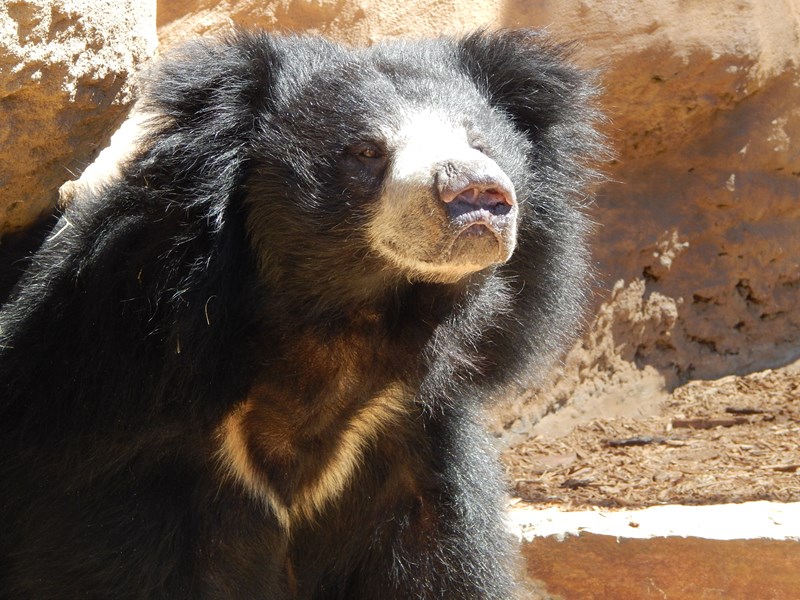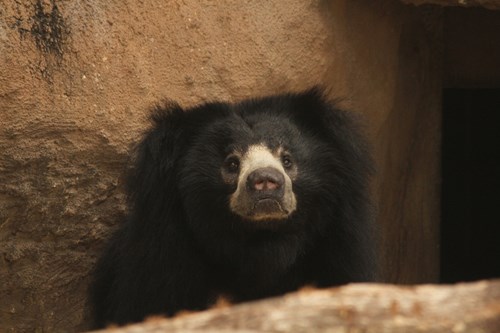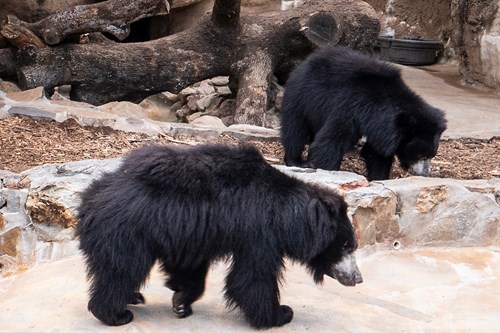
LITTLE ROCK (December 19, 2024) – The Little Rock Zoo is thrilled to welcome two special guests, Bhalu and Kayla, who arrived on November 25, 2024, from the Philadelphia Zoo. These two sloth bears will be with us temporarily while the Philadelphia Zoo renovates its sloth bear habitat. Their stay, expected to last about a year, is a shining example of how zoos collaborate to prioritize animal welfare and the conservation of species.
Meet Bhalu and Kayla
Bhalu, a male, and Kayla, a female, are a breeding pair who have temporarily joined our Zoo family. With their arrival, the Little Rock Zoo now houses six sloth bears—the largest group of this species at any AZA-accredited zoo in the United States!
Kayla’s arrival is particularly exciting because of her special connection to Little Rock. She is the sister of Sahaasa, a sloth bear who joined us in 2018. Both siblings were born at the Tautphaus Park Zoo in Idaho Falls in November 2012, making this a reunion of sorts for our sloth bear family.

Species Spotlight: The Unique Sloth Bear
Native to India, Nepal, and Sri Lanka, sloth bears are remarkable creatures with many unique characteristics. Known for their shaggy coats and distinctive whitish “V” or “Y” markings on their chests, they stand out among bear species.
Sloth bears are primarily nocturnal and have a specialized diet of termites, ants, fruits, and honey. Using their curved claws and powerful jaws, they expertly extract food, even closing their nostrils to keep out dust or insects while raiding termite mounds. They are skilled climbers and often forage for food in trees, adding to their adaptability.
One of their most endearing traits is their parenting behavior—sloth bears are the only bear species that routinely carry their cubs on their backs. Combined with their noisy, busy foraging habits, marked by grunts and snorts, these bears are endlessly captivating to observe.
The name “sloth bear” has an unexpected origin
Sloth bears are a fascinating species, and they even have a place in popular culture. In Rudyard Kipling’s The Jungle Book, Baloo was a sloth bear. The character’s name comes from the Hindi word bhalu (pronounced Baloo), which means “bear.” While bhalu refers to bears in general, it often signifies sloth bears in the Indian subcontinent, where they are the only native bear species.
The name “sloth bear,” however, has a more surprising origin. In 1791, European zoologist George Shaw mistakenly classified these unique bears as relatives of the Central and South American sloths due to their long, curved claws, missing front teeth, and occasional ability to hang upside down in trees. Believing them to be “bear-like sloths,” he gave them the name Bradypus ursinus, connecting them to the sloth genus.
Later research confirmed that sloth bears are true bears, leading to a new classification under the family Ursidae. The common name evolved as “bear sloth” flipped to “sloth bear,” though the original misclassification still influences its quirky name today.
Why They Matter
Sloth bears play a vital role in maintaining the health of their habitats, and their conservation is crucial to the ecosystem. As important seed dispersers, they help to regenerate forests and sustain the plant life that other species depend on. By foraging for termites and ants, sloth bears also contribute to controlling insect populations, which can otherwise damage vegetation. In this way, sloth bears support biodiversity and help maintain a balanced ecosystem, ensuring the survival of many plant and animal species in their range.
However, sloth bears are listed as vulnerable due to several pressing threats, including habitat loss, human-wildlife conflict, and poaching. Urbanization and deforestation have fragmented their natural habitats, while conflicts with humans over crops or livestock create additional challenges. Sloth bears are often persecuted when they venture into human settlements in search of food, and poaching and the illegal pet trade further jeopardize their survival.
The Little Rock Zoo is actively involved in efforts to protect sloth bears. One example is by our providing a temporary home for Bhalu and Kayla, our new sloth bear residents. Further, with our collaborations with other accredited zoos, we contribute to breeding programs and offer educational experiences that highlight the challenges sloth bears face in the wild. By engaging the public in these efforts, we aim to raise awareness about the importance of conserving these fascinating creatures and protecting their natural habitats.
Additionally, we are proud to partner with organizations like Wildlife SOS, who are doing incredible work to protect sloth bears and other species in India. In fact, some of our staff members are currently visiting India, where they are working directly with Wildlife SOS to support their efforts on the ground. We look forward to sharing more details of this partnership with our readers in a future blog post. This is just one more example of how we strive to make a meaningful impact in conserving our natural world.

Visit the Sloth Bears and Join Us in Conservation
This is your chance to see six sloth bears—the most in any zoo nationwide—right here in Little Rock! Stop by to meet Bhalu, Kayla, and the rest of the sloth bear family. Witness their unique behaviors, learn about their native habitats, and discover what makes them so special.
Your visit helps support our conservation initiatives, and every guest plays a role in protecting endangered species. For those who want to make an even bigger impact, consider donating to our conservation fund to help ensure a brighter future for sloth bears and other wildlife.
Plan your visit today—Bhalu, Kayla, and the rest of our sloth bears can’t wait to meet you!
Posted by Misty Waddle on 19 Dec 2024
About the author
Misty Waddle
Misty Waddle is the Guest Services & Marketing Coordinator at the Little Rock Zoo. Edited by Joy Matlock, Zoo Development & Marketing Coordinator.



